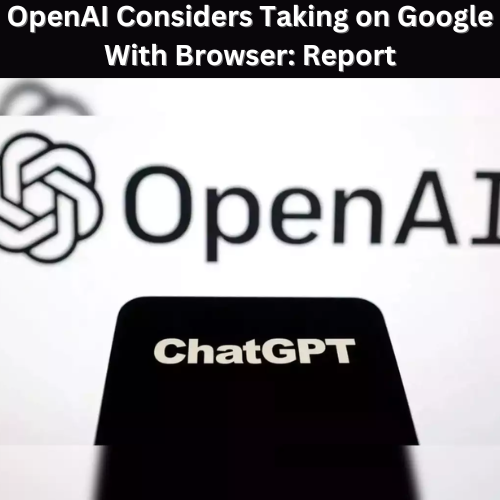Introduction
Could OpenAI be gearing up for its boldest move yet? Reports are swirling that the AI powerhouse might dive into the competitive browser market to take on none other than Google Chrome. Yes, you read that right—OpenAI may be eyeing the tech throne where Google reigns supreme. And honestly, the idea is nothing short of thrilling!
Let’s explore what this means, how it could shake up our browsing experiences, and whether OpenAI has what it takes to disrupt Google’s dominance. Grab your digital popcorn, because this story has all the makings of a tech blockbuster.

OpenAI’s Growing Footprint in Tech
OpenAI has been on a roll, hasn’t it? From revolutionizing the way we communicate with AI (hello, ChatGPT!) to reshaping industries, the company is no stranger to shaking things up. Their work is everywhere—from customer service bots to creative writing assistants—and now, they might be setting their sights on your web browser.
But this isn’t just about adding another browser to your device. If OpenAI jumps into this space, it could redefine how we interact with the web. Imagine a browser that’s deeply intelligent, learns your habits, and tailors your experience like a personal assistant. The potential is jaw-dropping!
Background: The Browser Battlefield
When you think of web browsers, what comes to mind? For most of us, it’s Google Chrome. With over 60% of the market share, Chrome has been the go-to for years. Safari and Microsoft Edge trail far behind, and even Mozilla Firefox, the once-beloved alternative, struggles to keep up.
So, why is this market so important? Browsers are our gateway to the internet. From shopping to streaming, we spend hours navigating the web, and the company that controls that portal has immense influence. For OpenAI, stepping into this arena could be its ticket to reshaping the way we experience the internet itself.
The Report: What We Know So Far
The buzz started with reports hinting at OpenAI’s potential plans to develop its own browser. While the details are scarce, the very idea has tech enthusiasts talking. Could it be a browser with AI at its core, designed to anticipate user needs? Or perhaps a tool focused on privacy and security, leveraging OpenAI’s innovation to outshine the competition?
What makes this rumor even more intriguing is the timing. With growing concerns about data privacy and a push for smarter, AI-driven tools, the market is ripe for disruption. If anyone can deliver a game-changing browser, it’s OpenAI.
OpenAI’s Potential Strategy: What Could Set It Apart?
If OpenAI does venture into the browser space, you can bet it won’t be “just another browser.” The company’s ace in the hole is its expertise in artificial intelligence. Imagine a browser that integrates ChatGPT to help you find exactly what you need, offers instant translations, or even summarizes lengthy articles with a single click.
And let’s talk about personalization! OpenAI could create a browser that learns your habits, optimizes your workflow, and makes every interaction smoother. Combine that with cutting-edge privacy features, and you’ve got a recipe for something truly revolutionary.
The Competition: Facing Google and the Rest
Going up against Google Chrome is no small feat. Chrome is fast, reliable, and already embedded in millions of devices. Plus, with Google’s ecosystem—think Gmail, YouTube, and Google Drive—it’s a tough act to follow.
But here’s the twist: OpenAI doesn’t need to dethrone Chrome overnight. By offering unique features that other browsers don’t, it can carve out a loyal user base. After all, competition fuels innovation, and there’s always room for fresh ideas in the tech world.
User Perspective: What’s in It for Us?
Let’s be real—most of us stick to our default browsers because they get the job done. But what if there was a browser that made your life noticeably easier? A tool that saved time, reduced frustration, and maybe even entertained you along the way?
An OpenAI browser could bring that dream to life. Whether it’s smarter search capabilities, seamless multitasking, or a more personalized browsing experience, users would finally have a reason to explore something new. And let’s not forget about privacy; if OpenAI can promise a secure, transparent browsing experience, it could win over skeptics in a heartbeat.
Broader Implications: How This Could Reshape the Web
A new player in the browser market doesn’t just mean more choice; it could spark a wave of innovation. If OpenAI successfully integrates AI into a browser, it might force other companies to up their game. We could see smarter tools, better privacy features, and entirely new ways to interact with the web.
And then there’s the ripple effect. From content creators to app developers, a new browser could create fresh opportunities for collaboration and creativity. The possibilities are endless—and that’s exactly what makes this so exciting.
Challenges for OpenAI: The Uphill Climb
Of course, breaking into the browser market won’t be a walk in the park. For starters, user loyalty is a huge hurdle. People are creatures of habit, and convincing them to switch browsers takes more than just flashy features.
Then there’s the technical side. Building a browser that’s fast, secure, and intuitive is no small task. Add to that the challenge of competing with Google’s resources, and it’s clear that OpenAI will need to bring its A-game.
The Future of Browsing: A New Era Awaits
The browser landscape has remained fairly stagnant for years, but AI has the power to shake things up. An OpenAI browser could signal the start of a new era—one where browsing isn’t just functional but truly intelligent.
Imagine a future where your browser understands your needs, adapts to your preferences, and turns web surfing into a seamless experience. It’s not just about competition; it’s about pushing the boundaries of what’s possible.
Conclusion: A Bold Move That Could Change Everything
OpenAI’s rumored foray into the browser market is more than just an exciting headline—it’s a potential game-changer. By leveraging its AI expertise, OpenAI could transform a tool we use every day into something smarter, faster, and more intuitive.
Whether this project becomes a reality or remains a tantalizing “what if,” one thing’s for sure: the tech world is watching closely. And honestly, so are we. After all, who doesn’t love a good underdog story?
